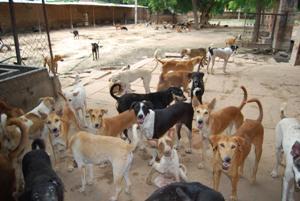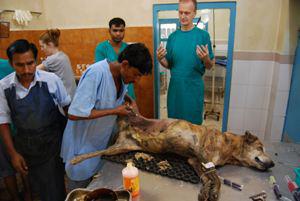Andrew Yoak
The aim of the project is to perform a broad cross-sectional survey of canid disease in three different Rajasthani cities. This will serve both as the first comparative study of canid disease between different ecological regimes and one of the more expansive surveys of presence.

Nuisance street dogs in Jodhpur.
Wildlife disease is poorly understood and the risk of spill over from domestic populations to related sylvatic varieties is difficult to quantify accurately. Worldwide, but particularly in India, the domesticated dog forms the main zoonotic pool for many diseases. These have serious implications for the life of both humans and endangered wild animals, as well as the economic productivity of pastoralists. The catastrophic decline of local Gyps vulture populations, coupled with a growing human population’s mounting refuse has allowed street dog’s populations to rise rapidly in Rajasthan. Local efforts to sterilize and vaccinate dogs has been successful but the scale is still small compared to the problem.

Dog birth control program operating in Jaipur.
We seek to investigate the drivers of disease epidemiology in the dog population and if the local animal birth control (ABC) organizations are making a measurable impact on non-vaccinated diseases. We will compare the dogs in three different areas covered by differing ABC programs at our study sites to determine how different management practices influence disease dynamics. This current situation provides a perfect environment to perform an epidemiological based cross-sectional survey in similar, but unique ecological regimes.
The ABC programs in Jodhpur and Jaipur in Rajasthan have been running for several years and they will serve as the experimental sites for ABC manipulation. These two locations differ only in the length of time the program has been running. A third city of Sawai Madhopur has no ABC program of consequence and is significant because of its proximity to Ranthambhore National Park, a major wildlife sanctuary for many threatened species.
This study will provide quantitative results from the management schemes for street dog control and to make recommendations to cash-strapped local governments for establishing sound dog control programs. Additionally it will be the largest survey of canid disease with co-morbidity, location, and season taken into account.